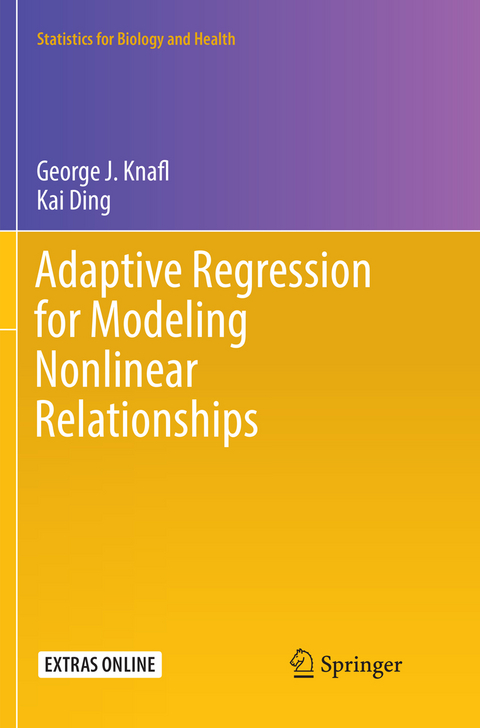
Adaptive Regression for Modeling Nonlinear Relationships
Springer International Publishing (Verlag)
978-3-319-81638-8 (ISBN)
This book presents methods for investigating whether relationships are linear or nonlinear and for adaptively fitting appropriate models when they are nonlinear. Data analysts will learn how to incorporate nonlinearity in one or more predictor variables into regression models for different types of outcome variables. Such nonlinear dependence is often not considered in applied research, yet nonlinear relationships are common and so need to be addressed. A standard linear analysis can produce misleading conclusions, while a nonlinear analysis can provide novel insights into data, not otherwise possible.
A variety of examples of the benefits of modeling nonlinear relationships are presented throughout the book. Methods are covered using what are called fractional polynomials based on real-valued power transformations of primary predictor variables combined with model selection based on likelihood cross-validation. The book covers how to formulate and conduct such adaptive fractional polynomial modeling in the standard, logistic, and Poisson regression contexts with continuous, discrete, and counts outcomes, respectively, either univariate or multivariate. The book also provides a comparison of adaptive modeling to generalized additive modeling (GAM) and multiple adaptive regression splines (MARS) for univariate outcomes.
The authors have created customized SAS macros for use in conducting adaptive regression modeling. These macros and code for conducting the analyses discussed in the book are available through the first author's website and online via the book's Springer website. Detailed descriptions of how to use these macros and interpret their output appear throughout the book. These methods can be implemented using other programs.
George Knafl is Professor and Biostatistician in the School of Nursing of the University of North Carolina at Chapel Hill where he teaches statistics courses to doctoral nursing students, consults with graduate students and faculty on their research, and conducts his own research. He has over 35 years of experience in teaching, consulting, and research in statistics. His research involves development of methods for searching through alternative models for data to identify an effective choice for modeling those data and the application of those methods to the analysis of health science data sets. He is also Professor Emeritus in the College of Computing and Digital Media at DePaul University and has also taught in Schools of Nursing at Yale University and the Oregon Health and Sciences University. Kai Ding is Assistant Professor, Department of Biostatistics and Epidemiology at the University of Oklahoma (OU) Health Sciences Center. He is also Associated Member of the Peggy and Charles Stephenson Cancer Center (SCC) of OU Medicine. Dr. Ding received his Ph.D. in Biostatistics from the University of North Carolina at Chapel Hill in 2010. His research has focuses on survival analysis and semiparametric inference. He has been involved in the design and analysis of numerous research studies in cancer and ophthalmology and currently serves on the Scientific Review Committee and the Protocol Monitoring Committee of the SCC.
Introduction.- Adaptive Regression Modeling of Univariate Continuous Outcomes.- Adaptive Regression Modeling of Univariate Continuous Outcomes in SAS.- Adaptive Regression Modeling of Multivariate Continuous Outcomes.- Adaptive Regression Modeling of Multivariate Continuous Outcomes in SAS.- Adaptive Transformation of Positive Valued Continuous Outcomes.- Adaptive Logistic Regression Modeling of Univariate Dichotomous and Polytomous Outcomes.- Adaptive Logistic Regression Modeling of Univariate Dichotomous and Polytomous Outcomes in SAS.- Adaptive Logistic Regression Modeling of Multivariate Dichotomous and Polytomous Outcomes.- Adaptive Logistic Regression Modeling of Multivariate Dichotomous and Polytomous Outcomes in SAS.- Adaptive Poisson Regression Modeling of Univariate Count Outcomes .- Adaptive Poisson Regression Modeling of Univariate Count Outcomes in SAS.- Adaptive Poisson Regression Modeling of Multivariate Count Outcomes.- Adaptive Poisson Regression Modeling of Multivariate Count Outcomes in SAS.- Generalized Additive Modeling.- Generalized Additive Modeling in SAS.- Multivariate Adaptive Regression Spline Modeling.- Multivariate Adaptive Regression Spline Modeling in SAS.- Adaptive Regression Modeling Formulation.
| Erscheinungsdatum | 05.03.2022 |
|---|---|
| Reihe/Serie | Statistics for Biology and Health |
| Zusatzinfo | XXV, 372 p. 57 illus., 13 illus. in color. |
| Verlagsort | Cham |
| Sprache | englisch |
| Maße | 155 x 235 mm |
| Gewicht | 611 g |
| Themenwelt | Mathematik / Informatik ► Mathematik ► Wahrscheinlichkeit / Kombinatorik |
| Studium ► Querschnittsbereiche ► Epidemiologie / Med. Biometrie | |
| Naturwissenschaften ► Biologie | |
| Schlagworte | adaptive modeling • Cross-validation • Fractional polynomials • Generalized additive modeling • Heuristic Search • nonlinear regression |
| ISBN-10 | 3-319-81638-1 / 3319816381 |
| ISBN-13 | 978-3-319-81638-8 / 9783319816388 |
| Zustand | Neuware |
| Informationen gemäß Produktsicherheitsverordnung (GPSR) | |
| Haben Sie eine Frage zum Produkt? |
aus dem Bereich


